Agriculture & Environment
Mak-CAES BioInnovate Project Registers Significant Achievements
Published
4 years agoon
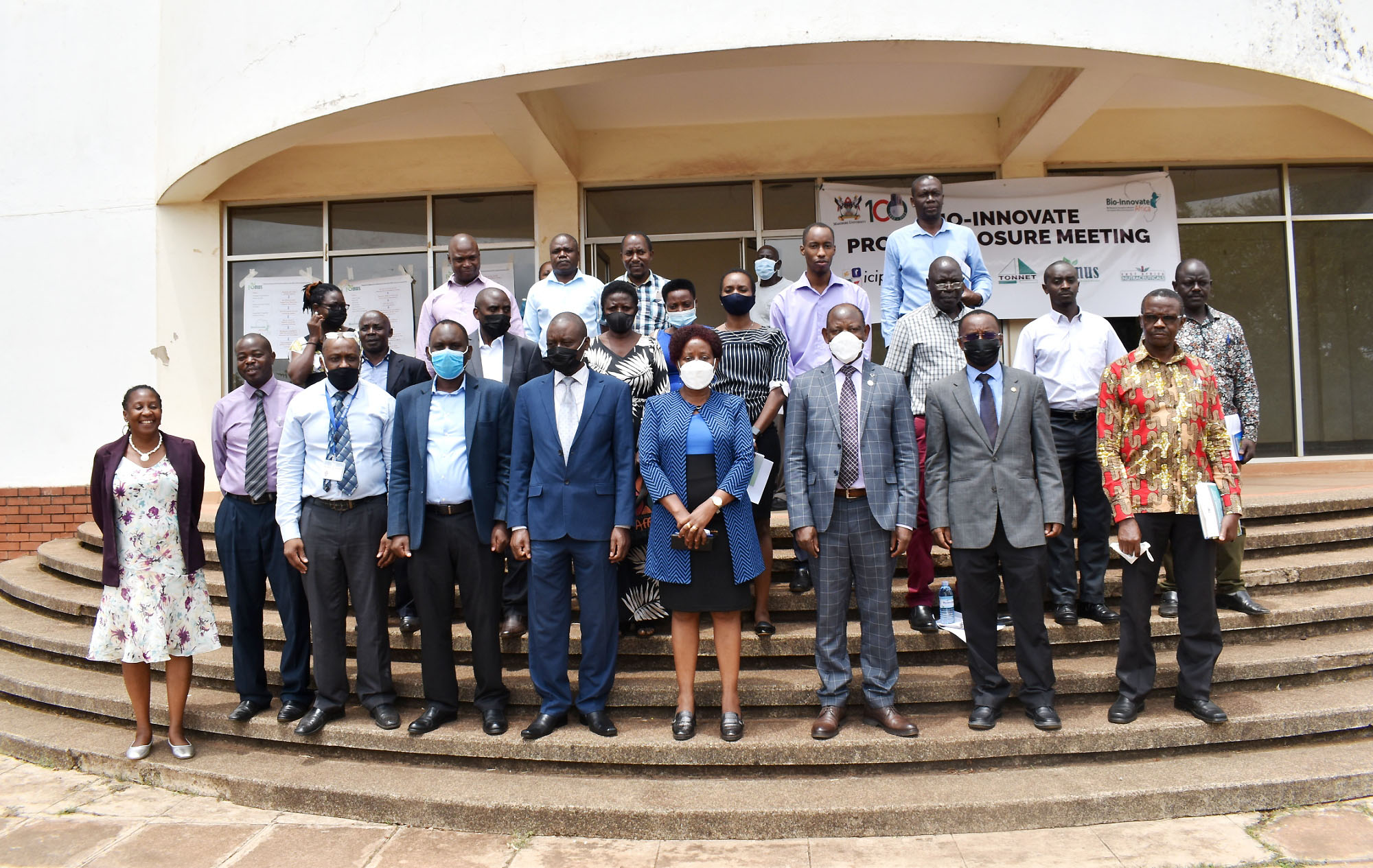
Smallholder farmers in Uganda and Kenya produce a variety of fruits, traditional and exotic vegetables, spices, and herbs that have unique nutritional, nutraceutical and functional properties. However, the value derived from these crops is limited due to postharvest losses, seasonal production, limited value addition and market access problems. Developing and applying affordable food preservation technologies could reduce postharvest losses by up to 68%. Additionally, food preservation by drying not only prolongs shelf life, but it also minimizes storage, transportation and packaging costs.
About the project
In 2017, Makerere University through the Department Agricultural and Biosystems Engineering at the College of Agricultural and Environmental Sciences (CAES) received funding under the BioInnovate Africa Programme Phase II to implement a project titled;“Adaptation and Promotion of Refractance Window Drying Technology (RWDT) for Production of High Quality Bio-products”. The RWDT uses heat to dry fruits and vegetables, while maintaining the nutritive qualities. With RWDT, liquid foods, purees or slices are dried on one side of a thin plastic film, whose other side is in close contact with hot water at temperatures below boiling point. The plastic film, usually in the form of a conveyer, is susceptible to infrared radiation, therefore allowing thermal energy to be transferred from the water to the food. Transmission of infrared radiation stops when the food is dry, and the product scraped off the conveyor. The temperature of the product remains relatively low during drying, resulting in better quality retention due to reduced moisture content and inhibited microbial growth. The heated water is recycled, further improving thermal efficiency of the system.
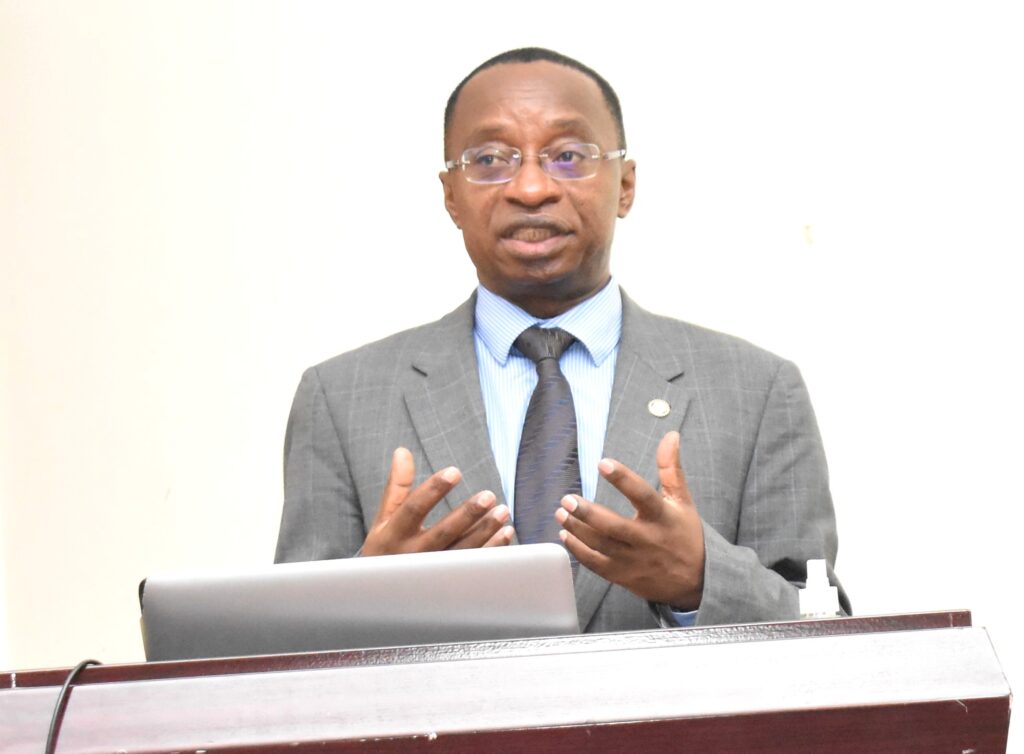
Project duration and objectives
The three-year project worth 750,000 USD had been scheduled to end in December 2020 but was extended to June 2021 due to the outbreak of COVID19 and the subsequent restrictions aimed at curbing the spread of the pandemic. The development objective of the project was to create new business opportunities in food value addition and agro-processing equipment fabrication. The project specifically aimed to develop a heat drying technology that is affordable yet yields high quality products, even from heat sensitive materials. It also aimed to; support local fabricators to make quality Refractance Window Drying equipment suitable for use by local agro-processors; improve the quality of products, mainly fruits, vegetables and herbs on the Ugandan& Kenyan markets; minimize post-harvest losses; increase the use of locally produced food ingredients derived from fruits, vegetables and herbs; and to enhance collaboration among farmers, agro-processors, researchers and support agencies.
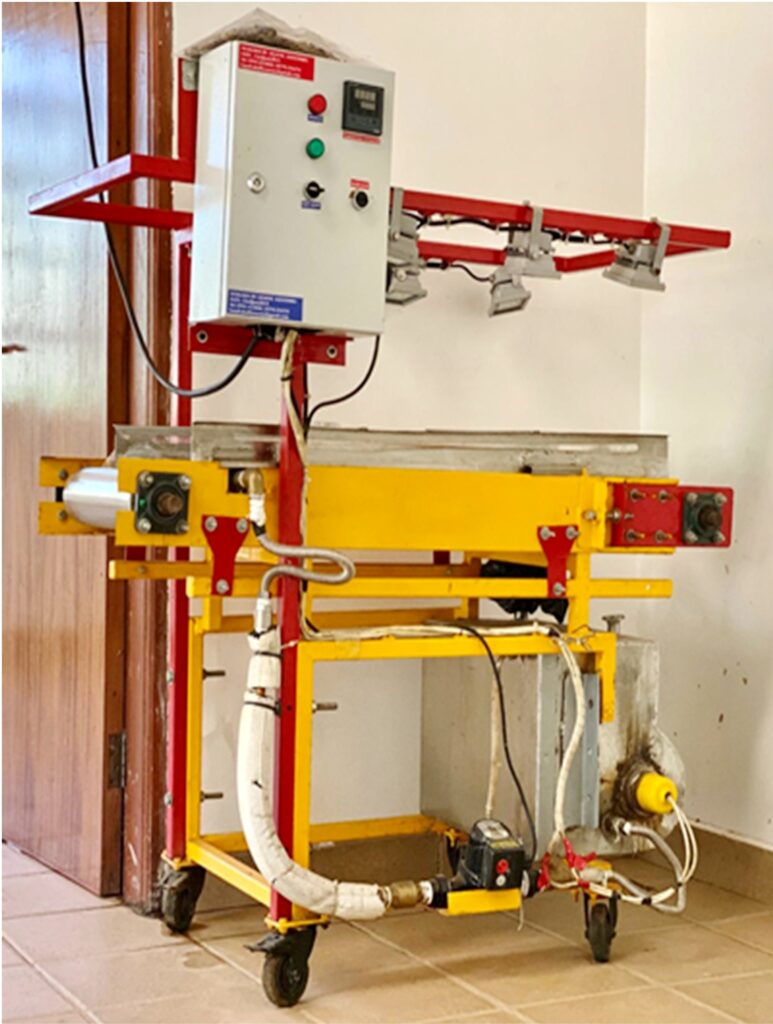
Project activities
Working with various partners namely; Jomo Kenyatta University of Agriculture and Technology, Kenya Industrial Research and Development Institute (KIRDI), TONNET Agro-engineering Company Limited, East Africa Nutraceuticals Ltd (EAN), Food and Nutrition Solutions Ltd (FONUS) and the Ministry of Trade, Industry and Cooperatives, Uganda, Makerere University implemented several activities under the project. These included designing and fabrication of low cost dryers, techo-economic evaluation of the dryers, evaluation of the refractance window dried products, assessment of the capacity of agro-processors and fabricators; training of farmers, agro-processors, and fabricators; and training of graduate students.
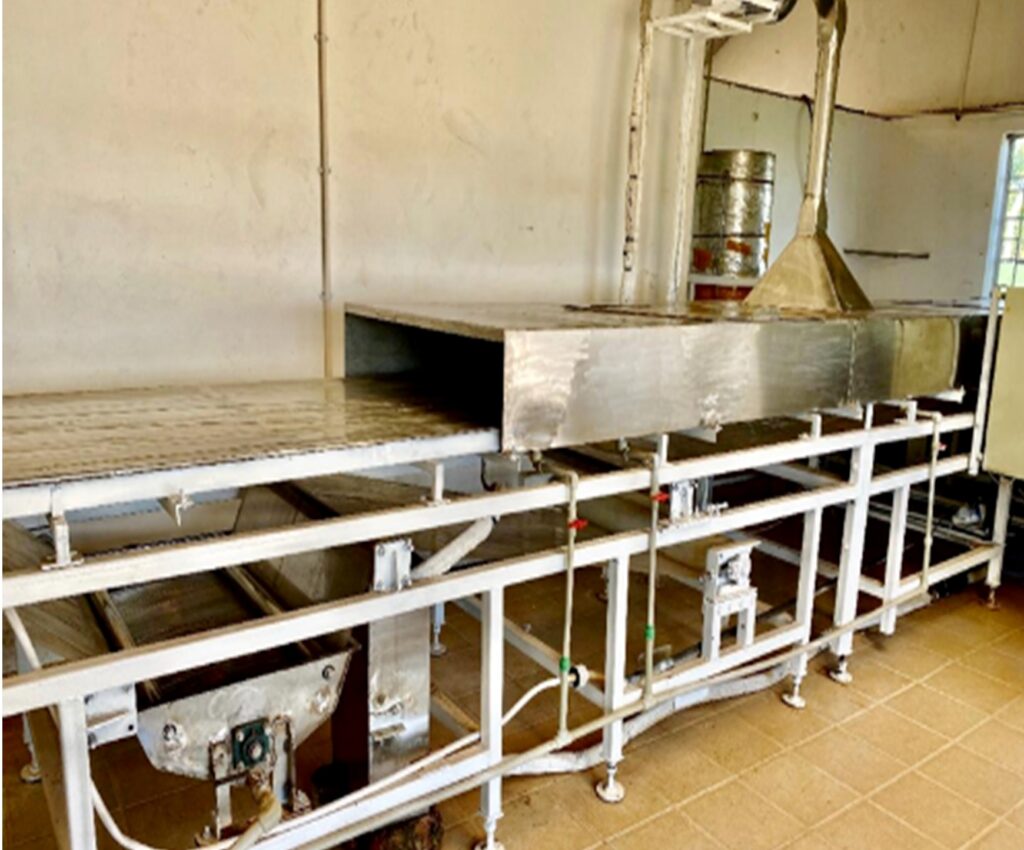
Project closure workshop
On 22ndMarch 2022, the research team led by Prof. John Muyonga held the project closure meeting at which they disseminated the findings and outputs. The meeting held in the School of Food Technology, Nutrition and Bio-Engineering Conference Hall was graced by the Vice Chancellor, Prof. Barnabas Nawangwe, the Principal CAES, Dr Gorettie N. Nabanoga, the Programme Manager of Bio-Innovate Africa Programmes, Dr Julius Ecuru, and representatives of partner institutions.
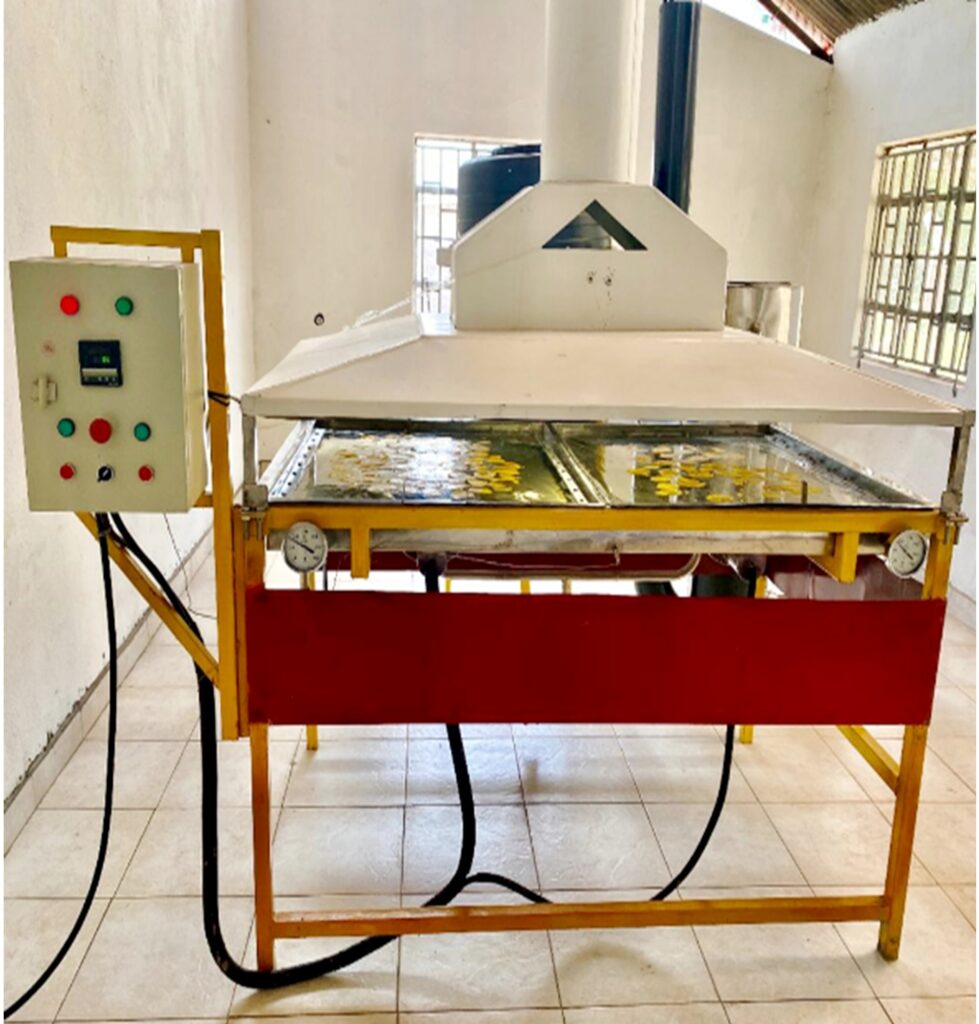
Achievements registered under the project
Disseminating the research findings, Prof. Muyonga noted that the project had registered significant achievements.
Guided by Prof. Muyonga, the project members including; Dr Julia Kigozi (Lecturer – Department of Agricultural and Biosystems Engineering, Makerere University) Dr. Peter Tumutegyereize (Department of Agricultural and Biosystems Engineering, Makerere University), Mr Shaffic Ssenyimba and Mr Raymond Mutumba (both MSc Students at Makerere University), and the TONNET Agro-engineering Company Limited team designed and fabricated several low cost refractance window drying machines. Additionally, the project team optimised the refractance window drying conditions for different products including passion fruit juice, pineapples, mango puree, jackfruit puree and cowpea leaves. They also developed protocols and guidelines for use of refractance window dried fruits as ingredients in foods. Using the RWD technology, the research team has produced a number of marketable products including – dried fruit slices, dices and strips; fruit powders; bread and cake containing refractance window dried fruits; as well as fruit gummies. The team is in the process of evaluating results for refractance window and solar dried pineapple slices. The team is also evaluating results for drinks produced from mixing refractance window dried pineapple powder in water, the different yoghurts, cookies and porridge made with different proportions of refractance window dried jackfruits, and breakfast cereal containing different proportions of refractance dried pineapple.
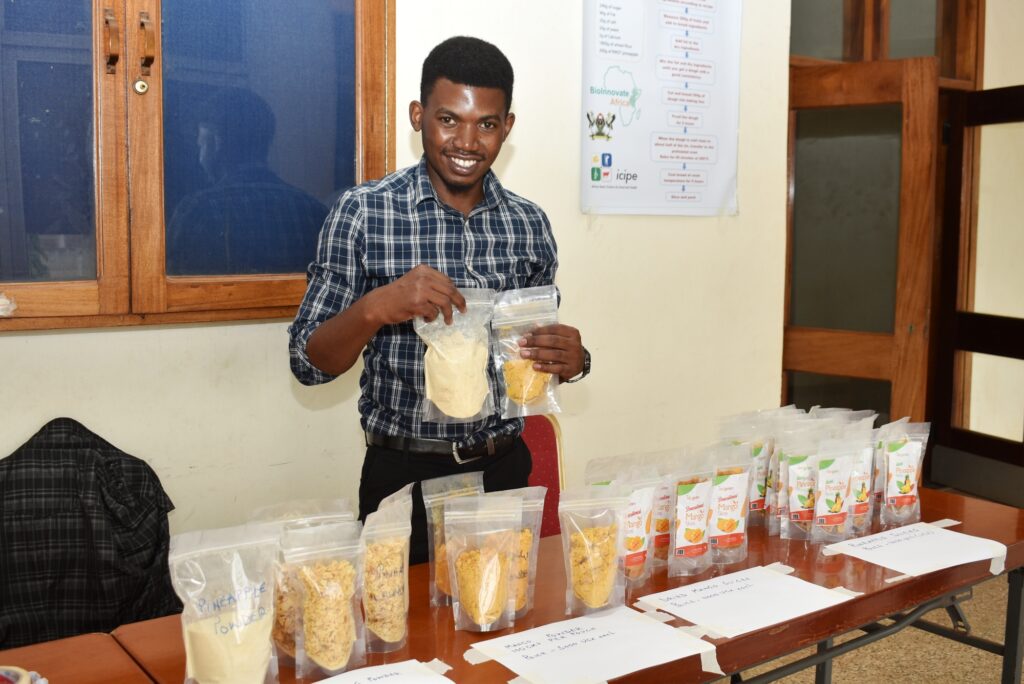
Other achievements registered under the project included; obtaining a Certificate of Grant of Utility Model from the Uganda Registration Services Bureau patenting the Electric and Biomass Powered Refractance Window Drying Apparatus invented by the research team; training of farmers in the use of Refractance Window Drying Technology and the use of RWD products as ingredients, training of 16 fabricators, training of 6 graduate students (2 PhD & 4 M.Sc.), refurbishment of facilities at Makerere University Agricultural Research Institute Kabanyolo (MUARIK); and publication of 12 articles in internationally recognized journals.
Articles published included;
(1) Adoption of the Refractance Window Drying Technology in the Drying of Fruits and Vegetables in Uganda –Journal of Advances in Food Science & Technology, 1-10;
(2)Design and Evaluation of a Refractance Window Lab-scale Dryer–Journal of Engineering, Design and Technology;
(3) Techno-Economic Analysis of a Refractance Window Dryer Prototype Developed by Kenya Industrial Research and Development Institute -Current Journal of Applied Science and Technology;
(4) Drying Behaviour and Optimization of Drying Conditions of Pineapple Puree and Slices using Refractance Window Drying Technology –Journal of Food Science and Technology, 1-10;
(5) Optimization of Refractance Window Drying Conditions for Passion Fruit Puree;
(6) Optimization of Drying Conditions for Jackfruit Pulp using Refractance Window Drying technology –Food Science & Nutrition;
(7) Performance Analysis of An Arduino Based Calibration and Temperature Control System for a Refractance Window Dryer;
(8) Arduino based control of the Food and Water Conveyance Systems of a Refractance Window Dryer;
(9) Techno Economic Analysis of Refractance Window Drying of Fruits: A Case of Small-Medium Scale Agro Processors in Uganda;
(10) Physicochemical Properties, Sensory Acceptance and Storage Stability of Yogurt Flavoured with Refractance Window Dried Passion Fruit Powder –Asian Food Science Journal, 38-49; and
(11) Exploring the Potential of Jackfruit (Artocarpus heterophyllus Lam), (2021) –Asian Food Science Journal. Page 97-117.
According to Prof. Muyonga, plans are underway to develop a Memorandum of Understanding between Makerere University and a private firm to oversee the utilisation of Refractance Window Drying equipment at MUARIK for commercial production of value added foods. “There are also plans to facilitate three agro-machinery companies – 2 in Uganda and 1 in Kenyato produce Refractance Window Dryers under the guidance of Makerere University and Kenya Industrial Research and Development Institute (KIRDI). We also hope to engage development agencies to support farmer groups to procure Refractance Window Dryers,” he noted while explaining the research team’s commercialization arrangements.
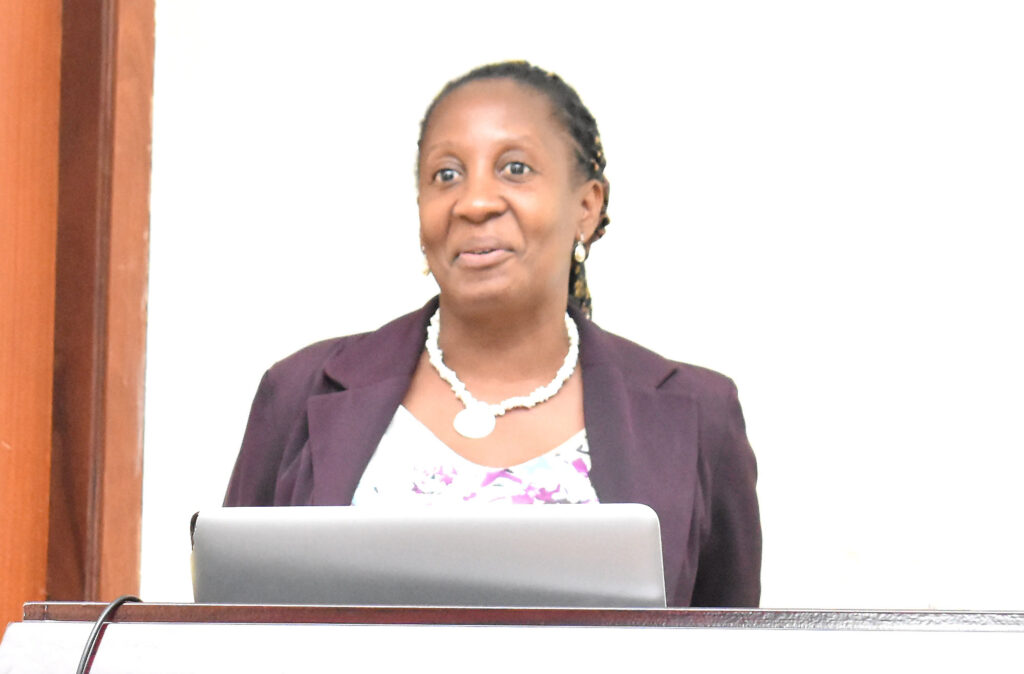
Explaining the design process of the Refractance Window Dryer, Dr Julia Kigozi said the technology is mechanically simple, cheaper to purchase, energy efficient with high drying speed and low operational costs, and ensures retention of product quality. Dr Kigozi revealed that steps were being taken to promote the use of RWD technologies through Jazi Agro-processing Solutions Limited. Jazi Agro-processing Solutions Limited is a private company that specializes in food processing and doubles as a consultancy in regards to agro-processing solutions with a goal of promoting the agro-processing sector in Uganda. The company carries out training and mentoring on fundamentals necessary for the operation of agro-processing industries.
During the meeting, Mr. Raymond Mutumba shared the outreach and dissemination programmes conducted by Food and Nutrition Solution Ltd (FONUS) with regard to the Refractance Window Drying Technology.Based at the School of Food Technology, Nutrition and Bio-Engineering, Makerere University, FONUS provides consultancy services in the fields of food value addition, community nutrition, food handling and hygiene, post-harvest handling of foodstuffs, facilitation of farmer group learning processes and project evaluations.The main purpose of FONUS’ engagement with the project was to promote uptake of the RWD technologies among end users. This was done through a series of engagements with farmer groups, small and medium agro-processors, and processors that utilise the RWD products and ingredients in foods.
Community engagements undertaken by FONUS included a situational analysis on the potential utilization of the Refractory Window Drier Technology in food value addition, training agro-processors in the use of hybrid RWD, and training of medium and large scale agro-processors in the use of RWDT in the drying of fruits and vegetables. In addition, FONUS conducted trainings on the use of RWDT products and ingredients and flavours in foods, and assessed the marketability of RWDT products.
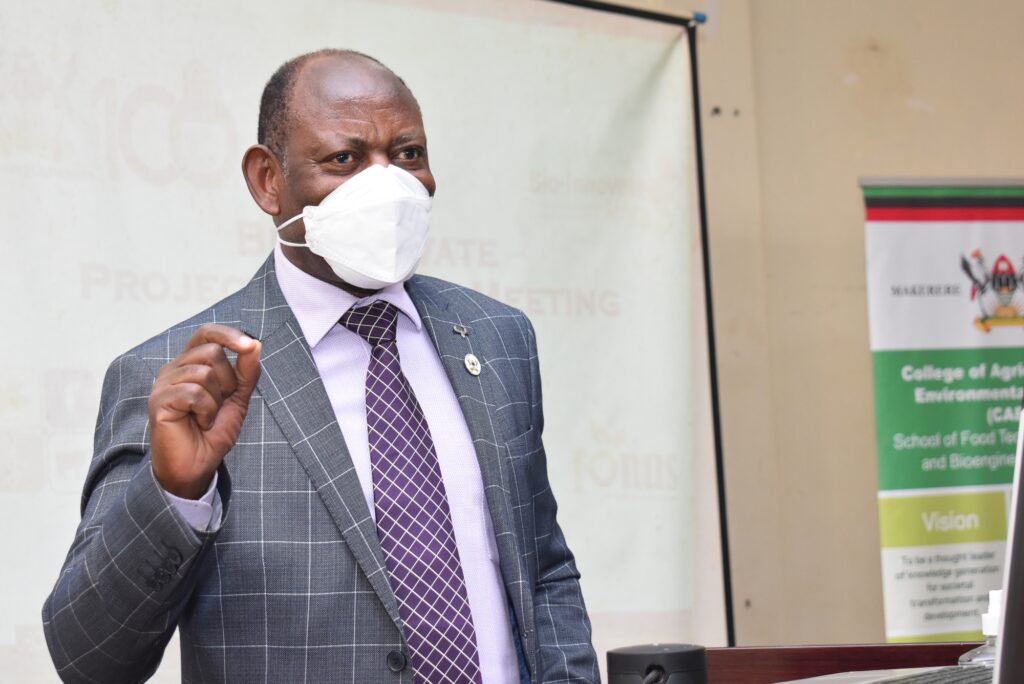
According to Mr. Mutumba, the community engagements revealed that the RWDT presented a viable solution for preservation of fruits and vegetables in Uganda. The engagements also revealed that the incubatees were more willing to adopt the technology compared to already established processors. It was also discovered that more research needs to be done in RWDT energy efficiency if the RWDT products are to have competitive process on the market. The team called for government support to increase uptake of the technology, noting that individuals and small processor groups may not easily afford it.
Addressing participants, the Vice Chancellor, Prof. Barnabas Nawangwe appreciated SIDA for the enormous support extended towards research and training programmes at Makerere University. “The University has reached the 1,000 mark of staff with PhDs, and almost half of these have been trained under SIDA,” he noted. In addition to other research programmes, SIDA supports the BioInnovate Africa Programme. The Vice Chancellor applauded the Department of Agricultural and Biosystems Engineering at CAES for the commendable initiative aimed at improving the quality and increasing shelf life of agricultural products in Uganda. “The products produced out of this initiative can be major exports for Uganda. We need to move towards commercializing our products. We however need to improve our marketing skills,” he explained while cautioning the research team on the importance of marketing the products. He also advised researchers to make use of the Intellectual Property Management Office at the University to patent their products.
Commenting on the significance of agriculture in the development of the economy, the Vice Chancellor said the CAES has a great role to play in improving the sector. Appreciating the research output at CAES, he called on the College to take lead in the establishment of a central business incubation unit to promote research and innovation at Makerere.
In line with 2020-2030 Strategic Plan that aims to transform Makerere into a research-led University, the Vice Chancellor said it was time to do things differently. “At the moment, Makerere is a research-intensive not research-led University. We have excelled in research publications. We need to move towards churning out companies if we are to make positive impact on our economy. You can remain top on research while churning out companies,” he explained, sharing an example of the University of Istanbul that churns out 300 companies per year worth about three billion USD, and is greatly contributing to the development of the country’s economy. The Vice Chancellor echoed the need for Makerere University to make contribution towards the Parish Development Model. “We will be judged harshly if we do not do anything to liberate our people,” he said.
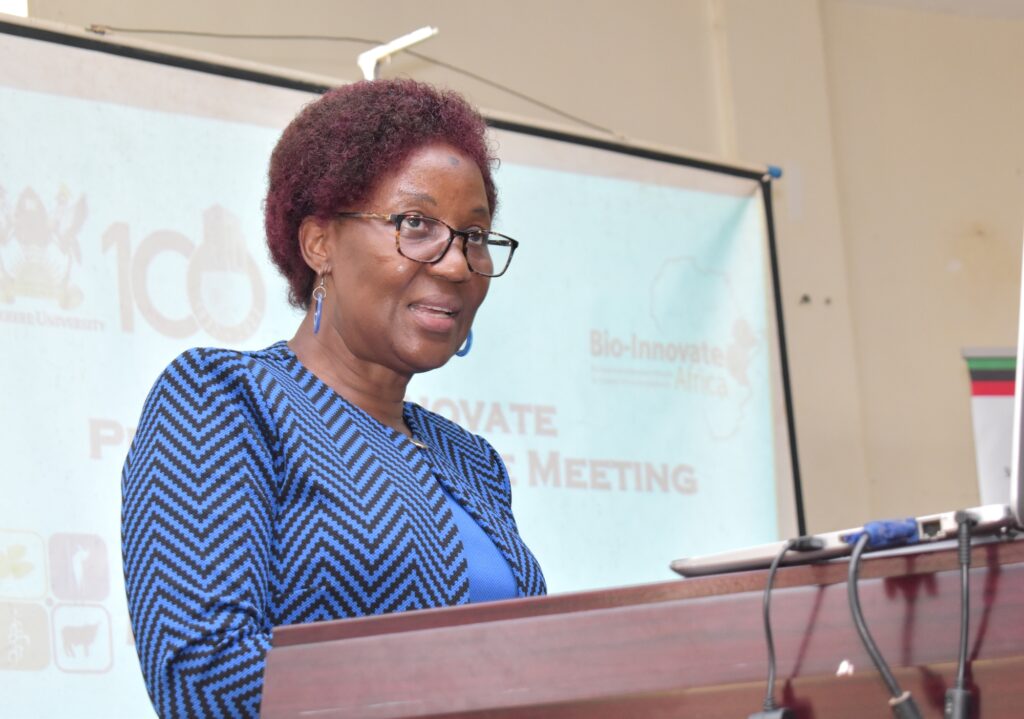
In her remarks, the Principal of CAES, Dr Gorettie N. Nabanoga appreciated SIDA and BioInnovate Africa for the support extended towards the research project. She applauded the School of Food Technology, Nutrition and Bio-Engineering for always writing successful projects. “Despite the small number of staff at the School, they feature prominently in resource mobilization,” she said. She commended the project implementation team for the significant outputs and strong partnerships. “The project has all that is required to be considered successful and is key to obtaining practical solutions for the agricultural sector,” she explained, noting that CAES is academically productive due to the tireless efforts of staff in different units. Commending the quality of the research outputs, Dr Nabanoga said the project would significantly address the current market needs.
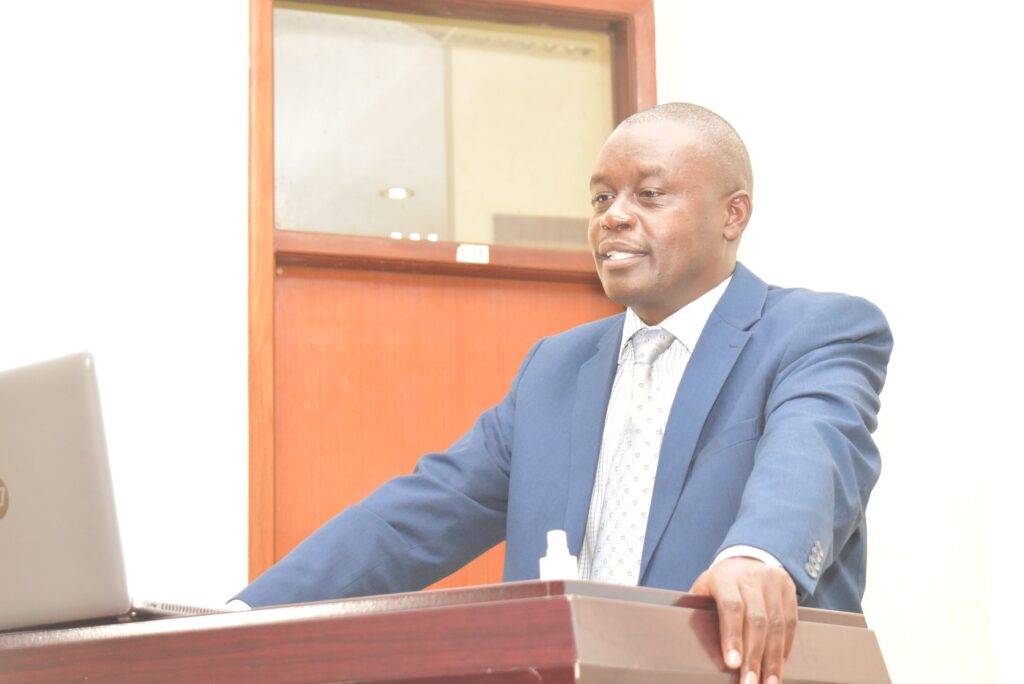
Like the Principal, the Dean, School of Food Technology, Nutrition and Bio-Engineering, Dr Abel Atukwase appreciated BioInnovate Africa for the support extended to the project. He expressed gratitude to the Vice Chancellor for his unwavering supports towards programmes at CAES and the University in general. He congratulated the project team upon the worthwhile initiative.
The Head, Department of Agricultural and Biosystems Engineering, Makerere University, Dr. Ivan Muzira Mukisa, acknowledged the efforts of Prof. Muyonga in promoting research and innovation at the College and University in general. “The success we continue to register is largely due to the commitment of staff. Prof. Muyonga has been a key pillar in research, teaching and mentorship of students,” he said. Highlighting the different research initiatives, including the Food Technology and Business Incubation Centre as well as FONUS, Dr Mukisa said the School had greatly provided opportunities for the processors to improve their skills.
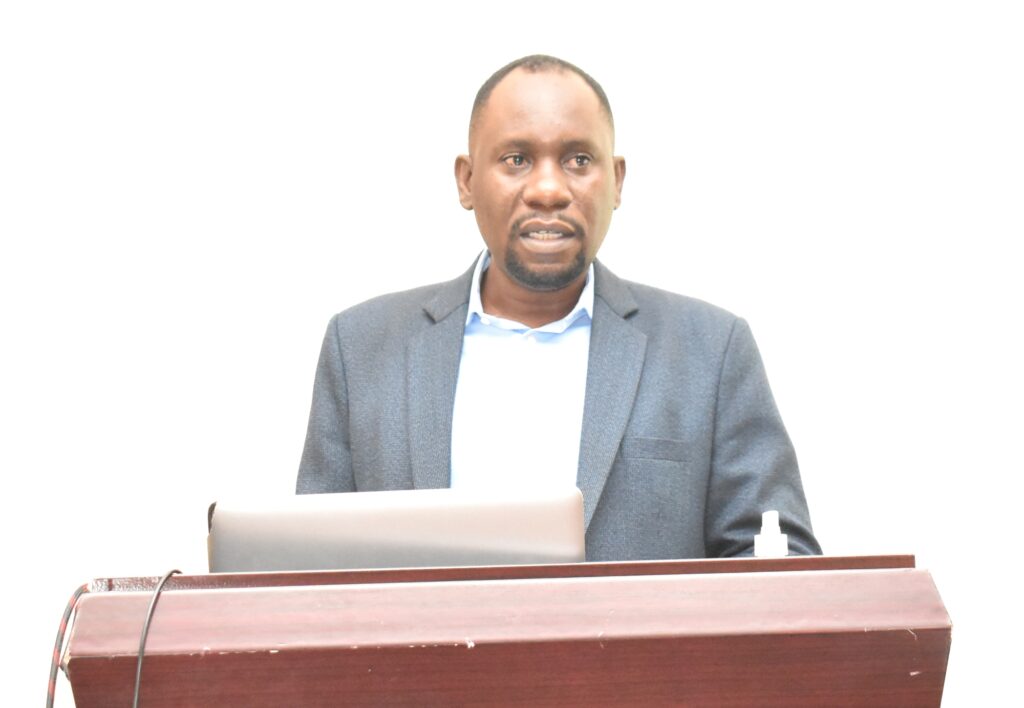
Delivering a presentation on government-academia-private sector partnership in technology development and promotion, the Representative of the Commissioner of Small and Medium Enterprises at the Ministry of Trade, Industry and Cooperatives, Dr Steven Mbogo Kirya thanked the sponsors of the project, as well as the partnering academic institutions for the efforts towards advancing agricultural technologies. He called for continued training of the youth and women in the utilization of new technology to boost the quality of agricultural products in the country.
The Programme Manager, BioInnovate Africa, Dr Julius Ecuru acknowledged the great work done by the research team, saying the project demonstrated that it is possible for academia, industry and government to work together to move ideas to the market. He commended Makerere University for winning 8 out of the 20 projects supported under BioInnovate Africa Programme Phase II. He pledged continued support for scientists in the region.
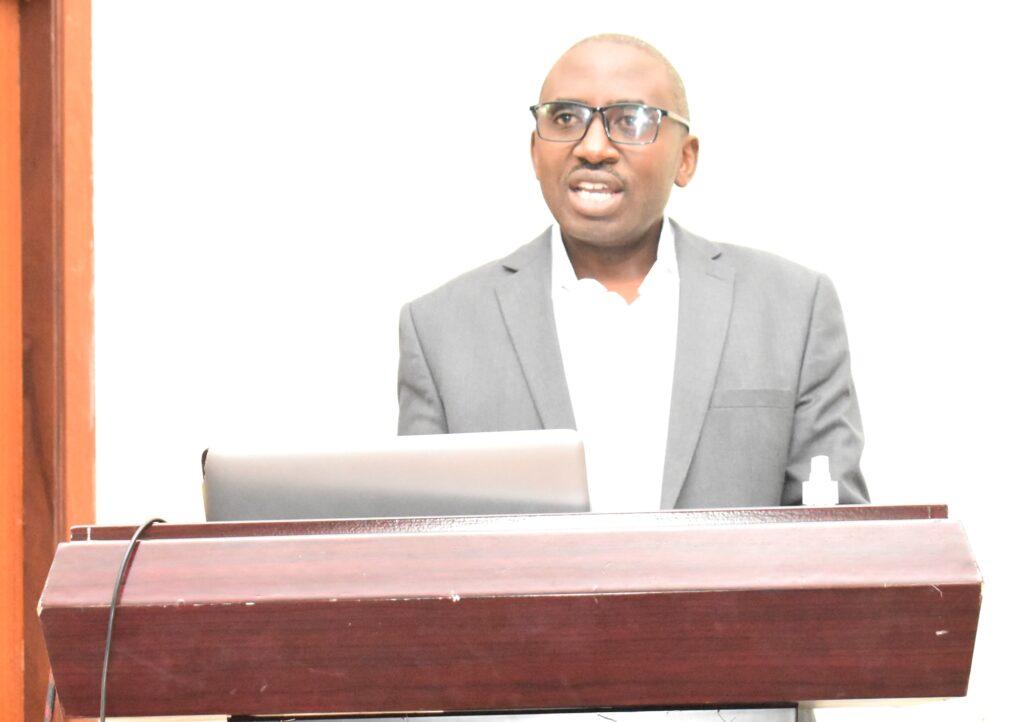
The workshop was moderated by Dr Gaston Ampe from the School of Food Technology, Nutrition and Bio-Engineering, CAES.
About BioInnovate Africa
BioInnovate Africa is a regional innovation-driven initiative stimulating a bio-economy in eastern Africa. The initiative is supported by the Swedish International Development Cooperation Agency (Sida), and implemented by International Centre of Insect Physiology and Ecology (icipe). The initiative supports multidisciplinary teams of scientists, researchers, and innovators to co-develop and pilot innovative and economically viable bio-based ideas, interventions, and technologies. BioInnovate Africa offers grants for innovative bio-based research ideas and technologies with prospects for business and the market. While funding bio-based innovation projects remains the core activity of BioInnovate Africa, the initiative’s strategy now includes developing a knowledge-based bioeconomy in eastern Africa. This is built on the premise that collaboration at the national and regional level, and between researchers and private sector partners, is the surest way to translate scientific outputs into usable, and commercially scalable products and technologies.Current BioInnovate Africa partner countries are: Burundi, Ethiopia, Kenya, Rwanda, Tanzania and Uganda.
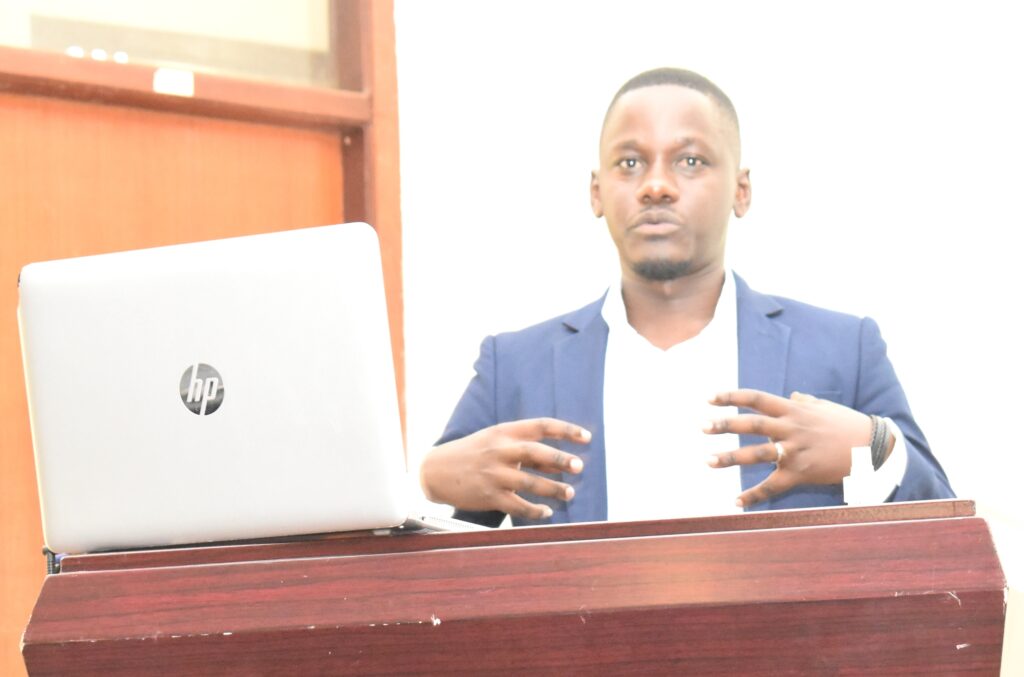
Please see Downloads below for presentations from the BioInnovate Closure Workshop
You may like
-


Mak News Magazine: February 2026
-


CAES Presents Overall Best Performing Student in the Sciences & a Record 28 PhDs at the 76th Graduation Ceremony
-


Graduation marks the next phase of accountability, graduates told
-


Over 9,200 to graduate at Makerere University’s 76th Graduation
-


76th Graduation Highlights
-


Mak Selected to Host Alliance for African Partnership Africa Office
Agriculture & Environment
CAES Presents Overall Best Performing Student in the Sciences & a Record 28 PhDs at the 76th Graduation Ceremony
Published
3 days agoon
February 25, 2026
The College of Agricultural and Environmental Sciences (CAES) presented the best performing student in the Sciences at the 76th Graduation Ceremony of Makerere University. Ms. Esther Ziribaggwa graduated with a CGPA of 4.77 in the Bachelor of Agricultural and Rural Innovation. She credits her success to resilience and hard work, despite the financial challenges she faced during her studies.
The four-day 76th graduation ceremony commenced on 24th February 2026 with the CAES, the College of Computing and Information Sciences (CoCIS), the College of Education and External Studies (CEES), and the School of Law presenting graduands for the award of degrees and diplomas of Makerere University.

CAES Graduation Statistics
CAES presented a total of 561 students (238 female and 323 male). Of these 28 (10 female and 18 male) graduated with PhD, 144 (68 female and 76 male) with Masters, 380 (157 female and 223 male) with Bachelor’s degrees, and 9 with Post graduate diplomas (3 female and 6 male). The PhD graduates included; Mr. Ainebyona Ronald Rwambuka, Ms. Amongi Winnyfred, Ms. Apil Jenifer, Mr. Asizua Denis, Mr. Astatke Dejene Kebede, Ms. Atuhairwe Privah, Ms. Ayesiga Stella Bigirwa, Mr. Biryomumaisho Dickson, Ms. Cherotich Harriet, Mr. Kalimunjaye Samuel, Ms. Kesiime Vasiter Eunice, Ms. Khakasa Elizabeth, Mr. Kimbowa George, Mr. Komi Gentle Wilson, Mr. Kusiima Kaheesi Samuel, Mr. Mathe Lukanda Musondolya, Mr. Mukama Innocent Hope Tinka, Mr. Mukengere Bagula Espoir, Mr. Nakhokho Evans Martin, Ms. Faridah Nalwanga Sendagire, Ms. Nalweyiso Amina, Ms. Nampijja Zainah, Ms. Njenga Peninah Wambui, Mr. Nkurunziza Gelase, Ms. Ojera Alal Ato Gertrude Miriam, Mr. Sebuliba Richard Mutumba, Mr. Shimali Fred, and Mr. Ssubi Allan Johnson.

Overall graduation Statistics
During the course of the 76th graduation ceremony, a total of 9,295 students will graduate with degrees and diplomas of Makerere University. Of these, 4,262 (46%) are female and 5,033 (54%) are male. A total of 213 students will graduate with PhDs, the highest number in the history of the University; 2,503 with Masters degrees; 6,343 with Bachelor’s degrees; 206 with postgraduate diplomas, and 30 with Diplomas.
Postgraduates constituted 31.4% of the total number of graduands.
Remarks by the Vice Chancellor
Addressing the congregation, the Vice Chancellor of Makerere University, Prof. Barnabas Nawangwe, congratulated the graduates on reaching this significant milestone. “You graduate today from one of the finest universities in the world,” he said. “You have distinguished yourselves through discipline, integrity, and academic excellence, and we are immensely proud of you. The qualifications you carry are vital to society. We have equipped you with the knowledge and skills to secure employment or to create enterprises that will, in turn, employ others. Should you not find immediate employment, do not despair, instead, reflect on the vast opportunities around you and rise to the challenge as entrepreneurs. Do not despise humble beginnings. To our PhD graduands, you now join the global community of scholars. Africa looks to you with great expectation. Use your expertise to transform our continent.”

He appreciated the parents and guardians for the sacrifices they made to support their children’s education.
New Research Excellence Recognition Plans
The Vice Chancellor informed the congregation that beginning with the 76th graduation ceremony, the University will recognize outstanding PhD students who are members of staff. He congratulated those who completed their doctoral studies in record time while continuing to serve without study leave, commending their resilience and leadership. “These will receive the Makerere PhD Resilience Award”.
Similarly, the University will henceforth honour the best PhD and Master’s theses, as selected by the Higher Degrees Committee of Senate. The students with the top 10 theses at the 76th graduation are: Kawesi Paul – MA Law (School of Law), Katende Stephen – MSc Quantitative Economics (COBAMS), Najjinda Shamirah – PhD Management (COBAMS), Turyahabwe Irene – MSc Molecular Biology (COVAB), Tayebwa Dickson – PhD (COVAB), Batte Herbert – PhD Mathematics (CONAS), Ssekago Arnold – MSc Mathematics (CONAS), Namiyingo Julian – PhD Literature (CHUSS), Namata Brenda – MSCO (CHUSS), and Tayebwa Asaph Kamau – MBA (MUBS).

Recognition of the CAES Research Output
In his remarks, the Vice Chancellor commended the College of Agricultural and Environmental Sciences for spearheading transformative research aimed at strengthening Africa’s food systems. Among the initiatives he highlighted was the Healthy Soy Project, funded by the Danish Ministry of Foreign Affairs, which seeks to develop sustainable, affordable, and nutritious soy-based foods to combat child stunting in Uganda and other climate-affected regions. He also cited a project focused on enhancing value addition in cocoa production through the development and scaling of a single fermentation box technology, now adopted by more than 70% of farmers in major cocoa-producing districts.

Efforts to Transform Makerere into a Research-led University
The Vice Chancellor noted that Makerere University continues to advance steadily toward becoming a truly research-led institution – one that generates knowledge to empower communities, strengthen industries, and drive national transformation.
He expressed gratitude to the Government of Uganda for entrusting the University with resources to support more than 1,400 high-impact research and innovation projects under the Makerere University Research and Innovations Fund (Mak-RIF). The Fund has enabled researchers to provide practical, evidence-based solutions in sectors including agriculture, land management, energy and minerals, peace and security, and education. Through Mak-RIF, over 200 PhD students have received support to pursue their research, many of whom are graduating at the 76th graduation ceremony.

The Vice Chancellor further highlighted the pivotal role of the Makerere University Technology and Innovations Centre (MUTIC) in advancing incubation and commercialization. “The Centre offers mentorship, business development training, intellectual property support, and industry linkages to help transform research outputs into viable enterprises. To date, eleven spin-off companies have been established by students and staff, while the University’s Innovation Pod (UniPod) has incubated more than 100 projects in the past year. The short-term target is to establish 50 spin-off companies annually, with plans to double that number in the long term.”
In partnership with the Science, Technology and Innovation Secretariat in the Office of the President, the University has also introduced awards to recognize outstanding researchers and innovators. “The Innovation Commercialization Award underscores the institution’s commitment to translating research into practical products, services, and technologies that address real-world challenges and support national development,” the Vice Chancellor noted.

Prof. Nawangwe appreciated the Government of Uganda for securing a USD 162 million loan from the Korea Exim Bank to support critical infrastructure development at the University. The funding will facilitate the construction of new facilities for the School of Medicine, School of Dentistry, School of Engineering, the Science and Technology Centre, and the completion of the School of Computing and Information Sciences- an unprecedented development in the University’s history.
He also thanked development partners who provide research grants and scholarships, including the MasterCard Foundation, European Union, Norwegian Agency for Development Cooperation, Swedish International Development Cooperation Agency, International Development Research Centre, Korea International Cooperation Agency, German Academic Exchange Service, National Institutes of Health, Centers for Disease Control and Prevention, United States Agency for International Development, Wellcome Trust, KfW, Inter-University Council for East Africa, Regional Universities Forum for Capacity Building in Agriculture, African Research Universities Alliance, the PLUS Alliance, the Worldwide Universities Network, the Association of African Universities, the Alliance for African Partnership, the Madhvani Foundation, and the Government of Uganda through the Higher Education Students Financing Board.

He further acknowledged the Embassy of China, the Chinese Chamber of Commerce, various government ministries, State House, and private sector partners – including Stanbic, Absa, NCBA, DFCU, and Centenary Bank-for their continued support.
Remarks by the Chancellor
In his remarks, the Chancellor, Hon. Dr. Crispus Kiyonga, appreciated the parents, guardians, and sponsors whose unwavering support enabled the students to succeed.
“At the heart of the graduands’ accomplishments are the professors, lecturers, and administrators of the University, ably supported by the University Council. It is only fitting that we acknowledge and commend them for a job well done,” he noted.

He further extended profound gratitude to H.E. Yoweri Kaguta Museveni and the NRM Government for the invaluable financial and other support extended to the University.
Going forward, he encouraged the University Administration to strengthen research funding, forge stronger partnerships with the private sector to commercialize innovations, deepen structured engagement with communities, and fully leverage the abundant technological resources available to the institution.
Message from the Minister of Education and Sports
The Minister of Education and Sports, also First Lady, Hon. Janet Kataaha Museveni, represented by Hon. Dr. Joyce Moriku Kaducu – Minister of State for Primary Education, commended the Vice Chancellor and the leadership of Makerere University for upholding the standards that continue to distinguish the University across Africa and beyond.

She expressed gratitude for the spirit of constructive collaboration among management, staff, students, and development partners, noting that such cooperation is vital for institutional growth and academic excellence. She paid special tribute to the University Council, particularly the Chairperson and its members, for their dedicated oversight and stewardship. Their commitment to transparency and good governance, she observed, has strengthened public confidence in this historic institution.
A major milestone highlighted by the Minister was the establishment of the Makerere University Research and Innovation Fund (RIF), which supports high-impact research aligned with national priorities and development goals. Through this initiative, thousands of researchers and innovators have developed practical, scalable solutions that are transforming communities and key sectors across Uganda.

She reaffirmed the Ministry’s commitment to strengthening higher education through expanded research funding, digital transformation, cultural reform, and stronger collaboration between academia and industry. “The vision is clear: universities must not only produce graduates, but also solution-makers and job creators”.
Implementing the Competence-based Education and Training
Reiterating a key directive from the Ministry of Education and Sports, she emphasized that all institutions of higher learning must prepare for the full implementation of Competence-Based Education and Training by July 2027. “This reform represents more than a policy shift. It signals a fundamental transformation in how graduates are prepared, with greater emphasis on practical skills, innovation, and problem-solving.”

She urged the Vice Chancellor and his team to lead in curriculum reform, staff development, and infrastructure enhancement to ensure the successful rollout of competence-based education.
The Minister further urged university management to ensure that all satellite campuses are fully accredited and that their programmes meet the same high standards of quality and relevance as those offered at the main campus. This, she stressed, is essential to safeguarding the integrity of the University’s degrees and effectively serving students nationwide.

Addressing the graduates, she noted that Uganda and Africa need innovators to modernize agriculture, engineers to build quality infrastructure, healthcare professionals to strengthen health systems, and educators to inspire future generations. “The world you are entering is dynamic, interconnected, and technologically driven. Artificial Intelligence is reshaping industries; climate change is redefining agriculture and urban planning; and global markets are transforming employment patterns. In this rapidly evolving landscape, you must remain adaptable, creative, and committed to lifelong learning.”
Address by the Commencement Speaker, Prof. Nicholas Ozor
In his address titled Knowledge with Purpose and Service with Integrity, the Commencement Speaker, Prof. Nicholas Ozor, Executive Director of the African Technology Policy Studies Network, urged the graduates to embrace lifelong learning, prioritize purpose over comfort, build character before career, and serve something greater than themselves. He encouraged them to believe in Africa and take action, rather than waiting for solutions from elsewhere.

Addressing the graduates of CAES, he emphasized that they stand at the intersection of survival and sustainability. “In a world confronting climate change, food insecurity, and environmental degradation, your knowledge is vital. You will work with farmers, ecosystems, land, water, and policy. You will shape food systems and livelihoods. Respect indigenous knowledge, embrace scientific innovation, and champion sustainability. The future of Africa depends on how well we feed our people and protect our land.”

Research Excellence and Innovation Commercialization Awards
During the graduation ceremony, Makerere University recognized the top researchers and innovators from the 10 Colleges. At CAES, Dr Mugabi Robert from the School of Food Technology and Nutrition received the Overall Top Researchers Award, 2026; Dr. Nalwanga Sendagire Faridah received the Best Early Career Researcher Award, Dr Mugabi Robert scooped the Mid-Career Research Award whereas Prof. Yazidhi Bamutaze got the Senior Career Research Award. Prof. Phinehas Tukamuhabwa, Dr Ephrahim Nuwamanya, Assoc. Prof. Ahamada Zziwa, and Dr Ssempijja John Edson were recognized among the best innovators.

More about Esther Ziribaggwa, the overall best performing student in the sciences:
Agriculture & Environment
Mak hosts First African Symposium on Natural Capital Accounting and Climate-Sensitive Macroeconomic Modelling
Published
1 week agoon
February 20, 2026
African economies are increasingly exposed to climate-related shocks that threaten development gains, fiscal sustainability, and macroeconomic stability. From extreme weather events and biodiversity loss to the depletion of natural capital, climate risks are reshaping economic realities across the continent. Yet many macroeconomic frameworks used in public finance and planning continue to overlook climate and nature-related risks and the long-term benefits of resilience and adaptation investments.
To address this emerging reality, over 250 participants from Africa, Europe and beyond, convened at Makerere University – Kampala, on the 12th and 13th of February 2026, to participate in the First African Symposium on Natural Capital Accounting and Climate-Sensitive Macroeconomic Modelling.
Following the theme, “Climate-Sensitive Macroeconomics: Rethinking Growth in Africa’s Natural Resource Base, the hybrid symposium organized by Makerere University through the Centre of Excellence for Africa Climate-Sensitive Macroeconomic Modelling (CEACM) within the School of Economics, under the College of Business and Management Sciences (CoBAMS), the Environment for Development Initiative (EfD), and the Ministry of Finance, Planning and Economic Development (MoFPED) in Uganda, brought onboard ministers, leading economists and planners, researchers, policy makers, the academia, development partners, climate change experts and the media.
The Symposium being the first of its kind on the continent, reflected Africa’s growing determination to work collectively in confronting shared development challenges, building on recent momentum such as the formation of Pan-African Finance Ministers Forum for Climate Action (PAFMCA).
Featuring speeches and presentations from notable speakers and partners, a keynote address on Natura Capital Accounting and Climate Change Nexus in Africa and their impact on Fiscal Policy, panel discussions, expert opinions, and exhibition kiosks (World Café), the symposium presented a platform to strengthen Africa’s analytical and institutional capacity to integrate climate and natural capital considerations into macroeconomic and fiscal policy.
Vice Chancellor underscores the role of universities
Welcoming the delegates to Makerere University, the Vice Chancellor-Prof. Barnabas Nawangwe emphasized that universities must lead innovation and collaborative research efforts to support collective climate change mitigation across the continent.
In the same vein, he advocated for strong collaboration between universities in Africa and government Ministries. “Makerere’s collaboration with the Ministry of Finance, Planning and Economic Development, stands as a shining example of how academia and government can strengthen economic management,” he said.

Prof. Nawangwe revealed that the collaboration between Makerere University and the Ministry, has strengthened macroeconomic modelling, fiscal policy analysis, and technical capacity within government. In addition, the partnership led to the establishment of the Centre of Excellence for Africa Climate-Sensitive Macroeconomic Modelling, bridging academic scholarship with real-world policy application.
“We have jointly established the Centre of Excellence for Africa Climate-Sensitive Macroeconomic Modelling. The Centre (established in August 2025) is anchored within the School of Economics in the Department of Policy and Development Economics, under the Master of Science in Economic Policy and Investment Modelling, a program jointly facilitated by Makerere University, the Ministry of Finance, Planning and Economic Development and the Bank of Uganda,” he mentioned.
Climate and Economic transformation are inseparable
The Vice Chancellor highlighted the critical intersection between economic transformation and environmental sustainability, noting that economies in Africa, heavily dependent on natural resources, face unprecedented pressures from climate shocks, biodiversity loss, and environmental degradation. Convinced that economic growth cannot be pursued in isolation from climate and environmental realities, he stressed the importance of integrating natural capital accounting and climate considerations into national development strategies.
Prof. Nawangwe advocated for shared responsibility of universities, research institutions, and policymakers to develop innovative analytical tools, responsive policy frameworks, and strong institutional capacities that promote sustainable growth while safeguarding environmental assets for future generations.
The Vice Chancellor commended UN PAGE and the Global Green Growth Institute (GGGI) for funding the symposium, as well as, other stakeholders namely the European Union and the Coalition of Finance Ministers for Climate Action (CoFMCA), Ministry of Water and Environment (MoWE), National Planning Authority (NPA), Uganda Bureau of Statistics (UBOS), the National Environment Management Authority (NEMA) for being reliable partners.
Integrating Climate into Fiscal Policy
During the opening ceremony, the Minister of Finance, Planning and Economic Development, Hon. Matia Kasaija underscored the urgency of embedding climate considerations into economic planning.
“As Ministers of Finance, we are often confronted with difficult trade-offs. Our task is to balance the needs of today with sustainability for future generations,” said Hon. Kasaija, in a speech read by Hon. Henry Musasizi, the Minister of State for Finance (General Duties).

The Minister guided that traditional macroeconomic models focusing only on growth, inflation, and fiscal balance are inadequate in an era of climate shocks. He affirmed that African economies are facing interconnected challenges which directly impact economic growth. He stressed that traditional macroeconomic frameworks must evolve to systematically incorporate environmental degradation and climate shocks, whose consequences can no longer be ignored in policy analysis.
“For countries such as Uganda, whose development prospects are closely linked to natural resources and the climate-sensitive sectors, these challenges are not abstract. They affect livelihoods, public finances and long-term economic resilience,” he mentioned.
The Minister emphasized that natural capital accounting and climate-sensitive macroeconomic modelling are vital for valuing natural assets, assessing environmental costs, and guiding sound investment decisions.
Protecting Africa’s Natural Capital
Hon. Beatrice Atim Anywar, Minister of State for Environment, emphasized the urgent need to protect Africa’s ecosystems. “Africa stands at a defining crossroads. Our economies remain anchored in natural capital—forests, water resources, biodiversity, land, and ecosystems—which sustain life, generate fiscal revenue, and underpin development,” she said.
She warned that climate-related shocks are already undermining growth and public investment. “Floods, droughts, land degradation, biodiversity loss, and water stress are no longer distant risks. They are present realities, already affecting productivity and macroeconomic stability,” she said.
She emphasized the need for improved economic models that account for environmental and climate risks: “Traditional macroeconomic frameworks have not adequately captured climate risks or the long-term economic benefits of resilience and adaptation. This limits our ability to make informed policy decisions as Africa pursues economic transformation, energy security, and fiscal stability,” she stated.
Hon. Anywar highlighted collaboration with GIZ, Makerere University, and government ministries, which led to the development of the MONCAP (Model for Natural Capital Policy Assessment). “This tool is being used to assess natural capital assets for climate change, energy transition, and their linkages to the macroeconomy. It supports budgeting by estimating the cost of depleted natural capital assets,” she said.
“Water security, forest conservation, ecosystem restoration, and climate adaptation are not costs. They are investments in Uganda’s long-term economic stability, productivity, and prosperity.”
Stakeholders urged to transform climate threats into opportunities
Adam Sparre Spliid, the Deputy Head of Mission, Danish Embassy said: “Integrating climate risk and natural capital into our macroeconomics frameworks is not only academic exercise, it is a massive de-risking strategy for private investment. By bridging the gap between government policy and planning, academia and research, and the private markets, we transform climate threats into tangible opportunities.”
Sustainability includes youth, jobs and human well-being
Dr. Steven Stone, Chair of the UN PAGE Management Board, emphasized that sustainability extends beyond the environment to encompass youth, jobs, economic growth, and human well-being. “While the environment is Africa’s foundational source of wealth, sustainable development requires balancing ecological stewardship with economic progress, including income and employment for the youth which are critical priorities for countries such as Uganda.”
Dr. Stone highlighted that UN PAGE, originating from the Rio+20 Conference, supports climate-sensitive economic policy in Africa, emphasizing that dialogue, scenario-building, cross-sector collaboration, and strong partnerships are key to advancing sustainable, inclusive, and climate-resilient development.
Africa’s Wealth Declining
In the keynote address titled, Natural Capital Accounting and Climate Change Nexus in Africa and their Impact on Fiscal Policy, Paul Jonathan Martin, Manager of Environmental Operations at the World Bank for Eastern and Southern Africa, and a specialist with over 30 years in climate and natural resources, warned that Africa’s overall wealth is under threat due to declining renewable natural capital.
“Produced capital has increased by 20%, human capital by a third, but renewable capital has declined by 30%,” Martin said. “When combined, Africa’s overall wealth trajectory has been weakening since 2010.”
He stressed that natural resources must be treated as economic assets requiring systematic accounting: “Africa’s rich natural resources are fundamental for sustainable development,” he said.
Citing examples from Ethiopia and Kenya, he highlighted successful integration of natural capital into public investment and budget decisions. “In Ethiopia, there are payments for ecosystems and investment prioritization tools. In Kenya, natural capital accounting integration into budgets has strengthened public investments. Climate change has deep, cascading effects across sectors, but Africa has major potential to lead climate solutions,” he said.

Martin also highlighted the economic benefits of climate adaptation: “From 2020–2050, the cumulative effect of adaptation on Uganda’s GDP is positive. Without action, under a dry/hot climate future, GDP could significantly deviate from projected growth paths.”
Drawing on insights from over 70 country climate and development reports produced by the World Bank, the keynote speaker highlighted the profound macroeconomic impacts of climate change across Africa. He stressed the importance of integrating climate and natural capital into macroeconomic planning. He noted that Africa’s forests, water systems, and biodiversity are vital for sustainable development but face growing threats from climate change, environmental degradation, and climate-related disasters that undermine productivity, public investment, and economic stability.
He observed that traditional macroeconomic models often fail to capture the value of natural assets and regulating ecosystem services, which are critical to both economic stability and resilience but are largely excluded from GDP calculations.
Africa-Led Solutions
Prof. Edward Bbaale, Principal, College of Business and Management Sciences (CoBAMS), stressed the importance of developing African-led solutions. “We need to champion the Africa-led model. We need approaches that fit our unique context. Africa is not here to take in other frameworks blindly,” he said.
By supporting research, training, policy dialogue and modelling innovation, the Centre of Excellence for Africa Climate Sensitive Macroeconomic Modelling (CEACM) positions Makerere University as a regional hub for advancing climate-sensitive macroeconomic policy across Africa.
He highlighted CEACM’s capacity-building programs: “Our goal is to ensure African Ministries of Finance have home-grown expertise to integrate climate and natural capital considerations into fiscal and macroeconomic policy. This is critical for long-term resilience and sustainable development,” he said.
The Principal explained that establishment of independent research centres enables Makerere University to go beyond traditional academic instruction and focus deeply on societal challenges, particularly those related to climate change, environmental degradation, and biodiversity loss.

He reported that the Centre of Excellence for Africa Climate-Sensitive Macroeconomic Modelling is structured to advance methodological innovation, develop new data systems, and strengthen climate-sensitive macroeconomic tools that are tailored to the African context.
MONCAP Model for Policy Assessment
Dr. Peter Babyenda, a member of faculty at CoBAMS, demonstrated MONCAP (Model for Natural Capital Policy Assessment), which integrates climate and natural capital variables into fiscal and macroeconomic planning.
“MONCAP allows policymakers to estimate the economic cost of depleting natural assets such as forests, wetlands, and water resources. It helps simulate policy options and determine how investments in natural capital yield long-term benefits,” Babyenda said. “We came up with this model to aid the Ministry of Water and Environment. This model is open—you can extend it,” he added.

He highlighted capacity-building initiatives, including short courses and the Master of Science in Macroeconomic and Investment Modelling, designed to train economists to incorporate natural capital and climate into policy planning.
International Perspectives
Sweetman Liam, Ireland’s Finance Minister, highlighted the economic value of ecosystems: “There is a deeper value of landscapes in flood prevention and biodiversity. Decision-making was informed, and people started understanding economic value,” he said.
Prof. Chukwuone Nnaemeka of the University of Nigeria emphasized collaboration with national statistical agencies: “We coordinate with the National Bureau of Statistics to develop natural capital accounting metrics. Increase the use of Natural Capital Accounting in decision-making,” he stated.
Technical and Parallel Sessions
The afternoon session featured three parallel sessions focusing on Natural Capital Accounting Methodologies and Best Practices, Climate-Sensitive Fiscal and Economic Modelling, and Natural Capital Accounting and Model Uptake and Use.
Drawing on diverse expertise, the panels highlighted innovative approaches and demonstrated that natural capital is not an environmental afterthought, but a central pillar of sustainable economic and policy planning.
The first day of the African Symposium drew to a close with interactive exhibitions at the World Café, where case studies and practical demonstrations highlighted innovative approaches to integrating climate and natural capital into economic planning. Participants actively engaged in discussions and networking, forging collaborations that promise to advance climate-sensitive fiscal and development strategies across Africa, setting a strong and optimistic tone for the days ahead.
Agriculture & Environment
Uganda Martyrs Namugongo Students Turn Organic Waste into Soap in an Innovative School Project on Sustainable Waste Management
Published
1 week agoon
February 20, 2026
*****The students were supervised by researchers from the College of Agricultural and Environmental Sciences (CAES) at Makerere University, led by Prof. Fred Kabi.
The garbage challenge
With urbanization rates rising rapidly across Uganda, municipal solid garbage generation in the country’s cities is projected to increase by more than 40 percent by 2050. The growing burden of unmanaged garbage, particularly organic garbage, continues to pose environmental and public health risks, underscoring the urgent need for innovative and sustainable solutions.
It is against this backdrop that Senior Four students of Uganda Martyrs Secondary School Namugongo undertook a project to demonstrate how local market garbage challenges can be transformed into opportunities for sustainable development.

Addressing the garbage Challenge
As part of their academic project under the competence-based curriculum, the students were tasked with identifying real-world challenges within their communities and developing practical solutions using locally available resources. Through research and field observations, they identified poor garbage management, particularly the accumulation of organic waste at major dumping sites such as Kiteezi Landfill, as a critical issue.
At these sites, unsorted solid garbage often accumulates uncontrollably, sometimes leading to collapses that pose serious environmental and public health risks including water contamination by leachates, persistent foul odors, and disease outbreaks.

Rather than solely viewing solid market garbage as a problem, the students recognized its untapped potential within the biodegradable fraction of market garbage streams. Their innovative solution was to convert organic solid market waste (biodegradable garbage) into an industrial raw material for soap production by utilizing saprophagous Black Soldier Fly larvae (BSFL) to accumulate lipids and applying the scientific process of saponification.
Makerere University Support to the project
The students’ project was supervised by Prof. Fred Kabi together with technicians from the College of Agricultural and Environmental Sciences (CAES) at Makerere University. Prof. Kabi and his team have been actively researching on Black Soldier Fly Larvae (BSFL) as a bio-waste management technology capable of converting biodegradable solid municipal garbage and farm waste into valuable by-products such as organic fertilizers, animal feeds, soap, and biodiesel.
Working in collaboration with Ento Organic Farm Uganda Ltd, the researchers have demonstrated how insect-based waste conversion systems can support a circular economy by transforming biodegradable waste into industrial raw materials.

According to Prof. Kabi, the five young garbage entrepreneurs (students) began their project by collecting information on household garbage management practices. After analyzing the data, they engaged stakeholders along the garbage value chain to brainstorm all-inclusive, source-based waste management strategies.
“The students developed a solution that links efficient waste management at garbage generation source to support production of organic fertilizer, insect protein for animal feeds, and soap, which is only possible with biodegradable garbage,” Prof. Kabi explained. “This approach of the Competence Based Curriculum (CBC) for lower secondary schools supports the concept of taking Makerere University to the community of budding scientists while promoting sustainable community development through a circular economy.”
From Market Waste to Soap Bars
The Team leader, Ms. Ivy Stephanie Kitali explained the step-by-step scientific process behind the project. The students began by collecting organic waste from local markets, which was then shredded to prepare it for the larvae as a substrate. “Black Soldier Fly larvae were then introduced to the prepared waste. The larvae efficiently consumed the organic matter, greatly reducing its volume while accumulating lipids (fats) in their bodies. After maturation, we separated the larvae from the remaining waste, euthanized through blanching and dried it. Oil was then extracted from the dried larvae using ethanol as a solvent. This lipid-rich oil became the primary ingredient or raw material for soap production. To enhance the final product, the larvae oil was blended with minute quantity of sunflower oil before adding sodium hydroxide, initiating saponification, the chemical reaction that transforms fats and oils into soap,” she explained. The process ultimately yielded usable bars of soap derived entirely from what had once been discarded as unwanted market waste/garbage.

Building Skills and Sustainable Innovation
Beyond producing soap, the project provided students with hands-on training in scientific research, waste management techniques, bio-chemistry, and sustainable innovation. They gained practical exposure to insect-based biotechnology and learned how environmental challenges can be addressed through science-driven by entrepreneurship.
Trending
-

 Humanities & Social Sciences5 days ago
Humanities & Social Sciences5 days agoMeet Najjuka Whitney, The Girl Who Missed Law and Found Her Voice
-

 Health1 week ago
Health1 week agoUganda has until 2030 to end Open Defecation as Ntaro’s PhD Examines Kabale’s Progress
-

 Agriculture & Environment1 week ago
Agriculture & Environment1 week agoUganda Martyrs Namugongo Students Turn Organic Waste into Soap in an Innovative School Project on Sustainable Waste Management
-

 General4 days ago
General4 days ago76th Graduation Highlights
-

 General1 week ago
General1 week agoMastercard Foundation Scholars embrace and honour their rich cultural diversity
